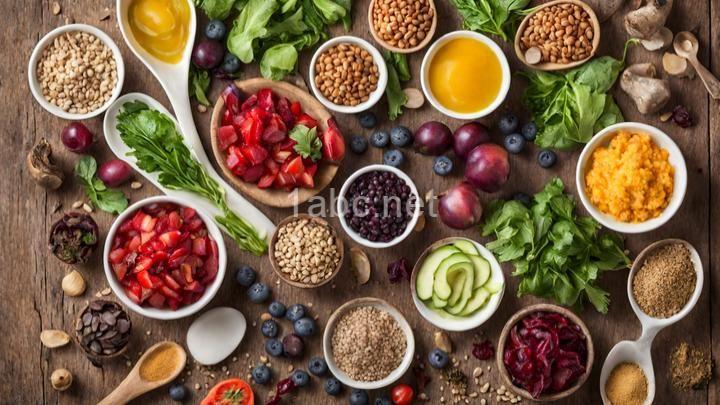The Benefits of Eating Salads: How They Can Boost Your Health and Wellbeing

Introduction
Salads are often underrated when it comes to their health benefits. Many people associate salads with boring and tasteless meals, but in reality, they are packed with nutrients that can greatly improve your overall health and wellbeing. In this blog post, we will explore the various ways in which salads can boost your health, from providing essential nutrients to promoting weight management and enhancing your immune system. So, let's dive in and discover the power of salads!
Nutritional Value of Salads
When it comes to salads, the possibilities are endless. From leafy greens to crunchy vegetables, salads offer a wide range of ingredients that provide essential nutrients to your body. Each ingredient in a salad has its own unique nutritional benefits. For example, leafy greens like spinach and kale are rich in vitamins A, C, and K, as well as iron and calcium. Tomatoes are packed with lycopene, a powerful antioxidant that may help reduce the risk of certain cancers. Other ingredients like carrots, bell peppers, and cucumbers add fiber, vitamins, and minerals to your salad. By incorporating a variety of ingredients into your salad, you ensure that you're getting a wide range of nutrients to support your overall health.
Weight Management
If you're looking to shed a few pounds or maintain a healthy weight, salads are your best friend. Salads are low in calories but high in fiber, making them a perfect choice for weight loss or weight management. The fiber in salads helps you feel full for longer, reducing the chances of overeating or snacking on unhealthy foods. It also aids in digestion and prevents constipation. By replacing calorie-dense meals with a well-balanced salad, you can reduce your calorie intake while still feeling satisfied and nourished.
Improved Digestion
One of the key benefits of consuming salads is their ability to promote healthy digestion. The fiber content in salads helps regulate bowel movements, preventing constipation and promoting regularity. Additionally, the water content in vegetables and fruits found in salads helps keep your digestive system hydrated and aids in the efficient breakdown and absorption of nutrients. By incorporating salads into your diet, you can support a healthy digestive system and ensure that your body is able to absorb all the essential nutrients it needs.
Increased Energy Levels
Do you often find yourself feeling sluggish and lacking energy? Salads can be the answer to your energy woes. The combination of vitamins, minerals, and antioxidants found in salads can give you a natural energy boost. For example, foods high in vitamin C, such as citrus fruits like oranges and grapefruits, can help enhance your energy levels. Iron-rich ingredients like spinach and lentils can also contribute to increased energy as they play a crucial role in carrying oxygen to your cells. By incorporating energizing ingredients into your salads, you can fuel your body with the nutrients it needs to stay energized throughout the day.
Enhanced Immune System
A strong immune system is essential for overall health and wellbeing, and salads can play a significant role in boosting your immune system. The vitamins and minerals found in various salad ingredients, such as vitamin C in citrus fruits and beta-carotene in carrots, can help strengthen your immune system and protect your body against infections. Leafy greens like spinach and arugula are also rich in antioxidants that can help reduce inflammation and support immune function. By regularly consuming salads, you can fortify your immune system and reduce the risk of falling ill.
Promoting Heart Health
Heart disease is a leading cause of death worldwide, but incorporating salads into your diet can significantly reduce the risk. Certain salad ingredients, such as avocados, nuts, and olive oil, are rich in heart-healthy fats and antioxidants. These ingredients can help lower cholesterol levels, reduce inflammation, and improve overall cardiovascular health. By including salads with these heart-healthy ingredients in your diet, you can take proactive steps toward maintaining a healthy heart.
Mental Wellbeing Benefits
While salads are known for their physical health benefits, they can also have a positive impact on your mental wellbeing. Research has shown that a nutrient-rich diet, including salads, can improve mood, cognition, and overall mental health. The vitamins and minerals found in salads, such as B vitamins and omega-3 fatty acids, play a crucial role in brain function and can help reduce the risk of mental health disorders. By nourishing your body with salads, you are not only taking care of your physical health but also supporting your mental wellbeing.
Conclusion
Incorporating salads into your diet is a simple yet powerful way to boost your health and wellbeing. From providing essential nutrients to supporting weight management, digestion, energy levels, immune function, heart health, and mental wellbeing, salads offer a wide range of benefits that should not be underestimated. So, the next time you think of salads, remember that they are not just a side dish but a powerhouse of nutrients that can transform your health. Start exploring different salad recipes and enjoy the multitude of benefits they have to offer. Your body will thank you!
Remember, it's important to consult with a healthcare professional or registered dietitian before making any significant changes to your diet.
FREQUENTLY ASKED QUESTIONS
What are the benefits of eating salads?
Eating salads offers a range of benefits for your overall health and well-being. Firstly, salads are packed with essential vitamins and minerals that are crucial for maintaining a strong immune system and supporting optimal bodily functions. These include vitamins A, C, and K, as well as folate and potassium.Additionally, salads are an excellent source of dietary fiber, which aids in digestion and promotes a healthy gut. Fiber also helps to keep you feeling fuller for longer, which can assist with weight management and prevent overeating.
Moreover, salads are a great way to incorporate a variety of fresh vegetables into your diet. Different vegetables offer different nutrients, so by including a mix of leafy greens, colorful veggies, and even some fruits, you can ensure you're getting a wide range of health-boosting compounds like antioxidants and phytochemicals.
Another benefit of eating salads is their hydrating effect. Many vegetables used in salads have high water content, which contributes to your daily hydration needs and helps keep your skin looking fresh and radiant.
Furthermore, salads can be a versatile and creative way to incorporate different flavors and textures into your meals. By adding protein-rich ingredients such as grilled chicken, tofu, or beans, you can transform a simple salad into a satisfying, well-balanced dish.
Lastly, salads are often low in calories and fat, making them a great choice for those looking to manage their weight or improve their overall diet. They can be a nutritious option for a light lunch or dinner, providing essential nutrients without compromising on taste.
In conclusion, the benefits of eating salads are numerous. From providing essential vitamins and minerals to promoting digestion, hydration, and weight management, salads offer a delicious and nutritious way to support your overall health. So go ahead and get creative with your salad creations - your body will thank you!
Can salads help with weight loss?
Yes, salads can definitely help with weight loss. Salads are typically low in calories and high in fiber, which can help you feel full and satisfied without consuming excess calories. The high water content in vegetables also adds volume to your meal, making you feel more satiated. Additionally, salads are packed with vitamins, minerals, and antioxidants, which are essential for overall health.To maximize the weight loss benefits of salads, it's important to choose nutrient-dense ingredients and watch out for high-calorie toppings and dressings. Opt for leafy greens like spinach or kale as a base, and add a variety of colorful vegetables such as carrots, cucumbers, and tomatoes. Adding a good source of lean protein, like grilled chicken or tofu, can also help keep you full for longer.
Remember, portion control is key. While salads can be healthy, it's still possible to consume too many calories if you pile on high-calorie toppings or dressings. Be mindful of your portion sizes and choose lighter dressings or use them sparingly.
Overall, incorporating salads into your meals can be a great strategy for weight loss. They provide a nutrient-packed, low-calorie option that can help you feel satisfied while promoting a healthy lifestyle.
Can salads provide all the necessary nutrients?
Salads can be a great source of essential nutrients, but whether they can provide all the necessary nutrients depends on the specific ingredients used and the overall variety in the salad. Leafy greens like spinach, kale, and arugula are packed with vitamins A, C, and K, as well as folate and fiber. These are important for maintaining a healthy immune system, promoting bone health, and aiding digestion.
Adding a variety of colorful vegetables such as bell peppers, tomatoes, cucumbers, and carrots can provide additional vitamins, minerals, and antioxidants. These can contribute to better eye health, heart health, and overall well-being.
Including protein sources like grilled chicken, tofu, beans, or nuts can help meet your daily protein needs. Protein is essential for building and repairing tissues, supporting muscle growth, and maintaining a healthy metabolism.
Adding healthy fats like avocado, olive oil, or nuts can provide important nutrients such as omega-3 fatty acids, which are beneficial for heart health and brain function.
To ensure a well-rounded salad, it's also important to include whole grains or complex carbohydrates like quinoa, brown rice, or whole wheat bread. These can provide energy and fiber, keeping you fuller for longer and supporting digestive health.
While salads can offer a wide range of nutrients, it's important to keep in mind that they may not provide all the necessary nutrients in sufficient quantities. It's always a good idea to incorporate a variety of foods from different food groups to ensure a balanced and nutritious diet. Consulting with a healthcare professional or a registered dietitian can also help you tailor your salad choices to meet your specific nutritional needs.
How can I make my salads more flavorful?
There are several ways to make your salads more flavorful and enjoyable. Here are some tips to enhance the taste of your salads:
Experiment with dressings: Try different types of dressings like balsamic vinaigrette, honey mustard, or a tangy citrus dressing. Homemade dressings can also add a unique flavor to your salads.
Add fresh herbs: Incorporate fresh herbs like basil, parsley, cilantro, or dill into your salads. They not only add a burst of flavor but also bring a touch of freshness.
Use different types of greens: Instead of sticking to just one type of lettuce, mix it up by using a variety of greens like spinach, arugula, or kale. Each type of green has its own distinct flavor profile.
Add some crunch: Adding crunchy elements like toasted nuts, seeds, or croutons can add texture and flavor to your salads. You can also try adding crispy vegetables like bell peppers or radishes.
Incorporate fruits: Adding fruits like strawberries, oranges, or pomegranate seeds can bring a delightful sweetness to your salads. They also provide a refreshing contrast to the vegetables.
Include protein: Adding protein-rich ingredients like grilled chicken, boiled eggs, tofu, or beans can make your salad more satisfying and flavorful. It also adds a savory element to the overall taste.
Experiment with cheese: Try adding different types of cheese like feta, goat cheese, or Parmesan to your salads. They add a creamy and tangy flavor that complements the other ingredients.
Season with spices: Sprinkle some spices like black pepper, cayenne pepper, or smoked paprika to enhance the flavor of your salads. Just a pinch can make a noticeable difference.
Remember, the key to making flavorful salads is to mix and match different ingredients and flavors. Don't be afraid to get creative and try new combinations. Enjoy your delicious and flavorful salads!
